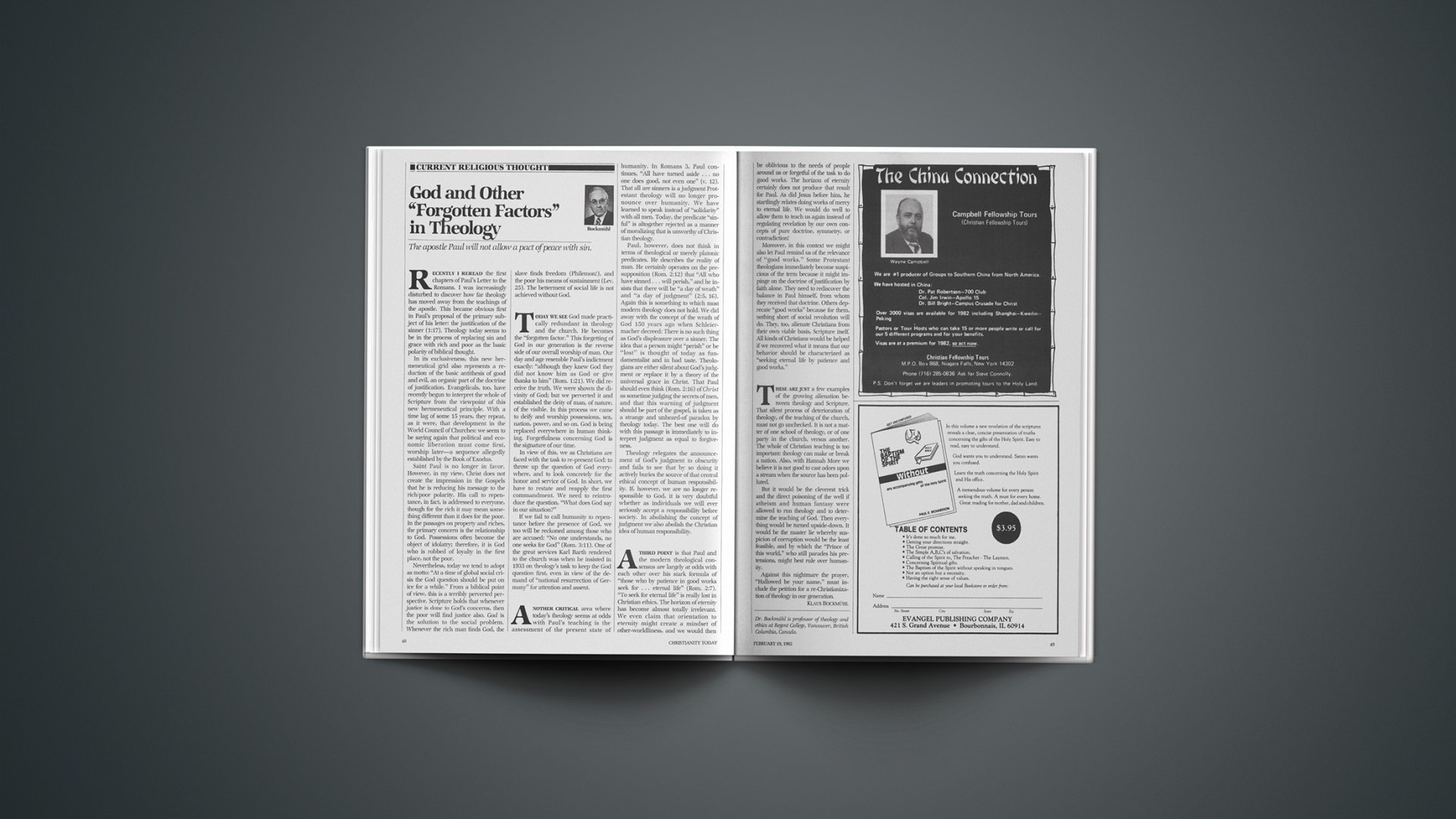The apostle Paul will not allow a pact of peace with sin.
Recently i reread the first chapters of Paul’s Letter to the Romans. I was increasingly disturbed to discover how far theology has moved away from the teachings of the apostle. This became obvious first in Paul’s proposal of the primary subject of his letter: the justification of the sinner (1:17). Theology today seems to be in the process of replacing sin and grace with rich and poor as the basic polarity of biblical thought.
In its exclusiveness, this new hermeneutical grid also represents a reduction of the basic antithesis of good and evil, an organic part of the doctrine of justification. Evangelicals, too, have recently begun to interpret the whole of Scripture from the viewpoint of this new hermeneutical principle. With a time lag of some 15 years, they repeat, as it were, that development in the World Council of Churches: we seem to be saying again that political and economic liberation must come first, worship later—a sequence allegedly established by the Book of Exodus.
Saint Paul is no longer in favor. However, in my view, Christ does not create the impression in the Gospels that he is reducing his message to the rich/poor polarity. His call to repentance, in fact, is addressed to everyone, though for the rich it may mean something different than it does for the poor. In the passages on property and riches, the primary concern is the relationship to God. Possessions often become the object of idolatry; therefore, it is God who is robbed of loyalty in the first place, not the poor.
Nevertheless, today we tend to adopt as motto: “At a time of global social crisis the God question should be put on ice for a while.” From a biblical point of view, this is a terribly perverted perspective. Scripture holds that whenever justice is done to God’s concerns, then the poor will find justice also. God is the solution to the social problem. Whenever the rich man finds God, the slave finds freedom (Philemon!), and the poor his means of sustainment (Lev. 25). The betterment of social life is not achieved without God.
Today we see God made practically redundant in theology and the church. He becomes the “forgotten factor.” This forgetting of God in our generation is the reverse side of our overall worship of man. Our day and age resemble Paul’s indictment exactly: “although they knew God they did not know him as God or give thanks to him” (Rom. 1:21). We did receive the truth. We were shown the divinity of God; but we perverted it and established the deity of man, of nature, of the visible. In this process we came to deify and worship possessions, sex, nation, power, and so on. God is being replaced everywhere in human thinking. Forgetfulness concerning God is the signature of our time.
In view of this, we as Christians are faced with the task to re-present God: to throw up the question of God everywhere, and to look concretely for the honor and service of God. In short, we have to restate and reapply the first commandment. We need to reintroduce the question, “What does God say in our situation?”
If we fail to call humanity to repentance before the presence of God, we too will be reckoned among those who are accused: “No one understands, no one seeks for God” (Rom. 3:11). One of the great services Karl Barth rendered to the church was when he insisted in 1933 on theology’s task to keep the God question first, even in view of the demand of “national resurrection of Germany” for attention and assent.
Another critical area where today’s theology seems at odds with Paul’s teaching is the assessment of the present state of humanity. In Romans 3, Paul continues, “All have turned aside … no one does good, not even one” (v. 12). That all are sinners is a judgment Protestant theology will no longer pronounce over humanity. We have learned to speak instead of “solidarity” with all men. Today, the predicate “sinful” is altogether rejected as a manner of moralizing that is unworthy of Christian theology.
Paul, however, does not think in terms of theological or merely platonic predicates. He describes the reality of man. He certainly operates on the presupposition (Rom. 2:12) that “All who have sinned … will perish,” and he insists that there will be “a day of wrath” and “a day of judgment” (2:5, 16). Again this is something to which most modern theology does not hold. We did away with the concept of the wrath of God 150 years ago when Schleiermacher decreed: There is no such thing as God’s displeasure over a sinner. The idea that a person might “perish” or be “lost” is thought of today as fundamentalist and in bad taste. Theologians are either silent about God’s judgment or replace it by a theory of the universal grace in Christ. That Paul should even think (Rom. 2:16) of Christ as sometime judging the secrets of men, and that this warning of judgment should be part of the gospel, is taken as a strange and unheard-of paradox by theology today. The best one will do with this passage is immediately to interpret judgment as equal to forgiveness.
Theology relegates the announcement of God’s judgment to obscurity and fails to see that by so doing it actively buries the source of that central ethical concept of human responsibility. If, however, we are no longer responsible to God, it is very doubtful whether as individuals we will ever seriously accept a responsibility before society. In abolishing the concept of judgment we also abolish the Christian idea of human responsibility.
A third point is that Paul and the modern theological consensus are largely at odds with each other over his stark formula of “those who by patience in good works seek for … eternal life” (Rom. 2:7). “To seek for eternal life” is really lost in Christian ethics. The horizon of eternity has become almost totally irrelevant. We even claim that orientation to eternity might create a mindset of other-worldliness, and we would then be oblivious to the needs of people around us or forgetful of the task to do good works. The horizon of eternity certainly does not produce that result for Paul. As did Jesus before him, he startlingly relates doing works of mercy to eternal life. We would do well to allow them to teach us again instead of regulating revelation by our own concepts of pure doctrine, symmetry, or contradiction!
Moreover, in this context we might also let Paul remind us of the relevance of “good works.” Some Protestant theologians immediately become suspicious of the term because it might impinge on the doctrine of justification by faith alone. They need to rediscover the balance in Paul himself, from whom they received that doctrine. Others deprecate “good works” because for them, nothing short of social revolution will do. They, too, alienate Christians from their own viable basis, Scripture itself. All kinds of Christians would be helped if we recovered what it means that our behavior should be characterized as “seeking eternal life by patience and good works.”
These are just a few examples of the growing alienation between theology and Scripture. That silent process of deterioration of theology, of the teaching of the church, must not go unchecked. It is not a matter of one school of theology, or of one party in the church, versus another. The whole of Christian teaching is too important: theology can make or break a nation. Also, with Hannah More we believe it is not good to cast odors upon a stream when the source has been polluted.
But it would be the cleverest trick and the direct poisoning of the well if atheism and human fantasy were allowed to run theology and to determine the teaching of God. Then everything would be turned upside-down. It would be the master lie whereby suspicion of corruption would be the least feasible, and by which the “Prince of this world,” who still parades his pretensions, might best rule over humanity.
Against this nightmare the prayer, “Hallowed be your name,” must include the petition for a re-Christianization of theology in our generation.
Dr. Bockmühl is professor of theology and ethics at Regent College, Vancouver, British Columbia, Canada.










